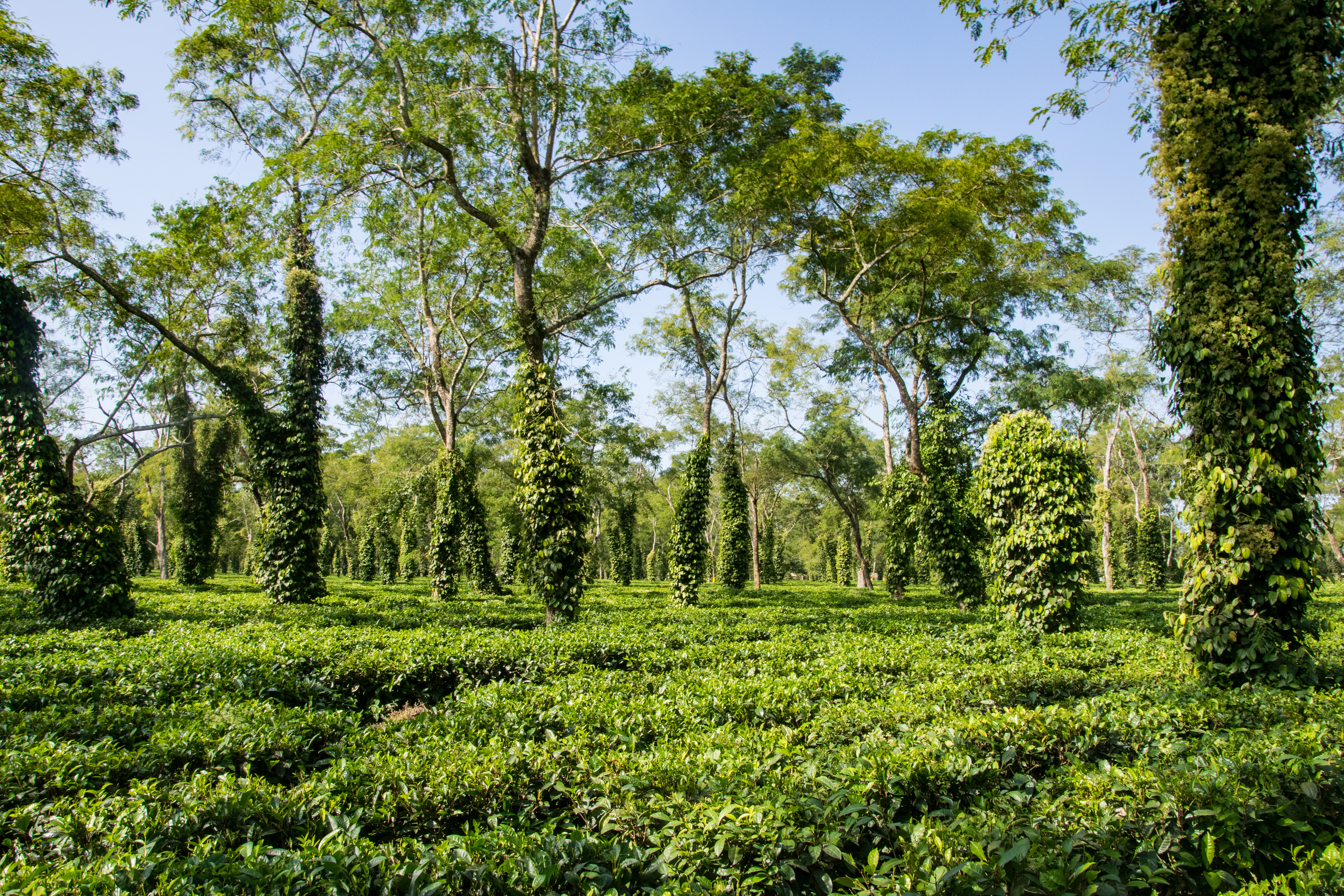
Assam tea is a popular type of tea that is grown in the northeastern region of India. Known for its rich and bold flavor, Assam tea is a favorite among tea drinkers all over the world. However, one question that often arises is how much caffeine is in Assam tea. In this blog post, we will explore the caffeine content of Assam tea and provide you with some interesting facts about this beloved beverage.
Introduction
The introduction provides a brief overview of what Assam tea is and why it is a popular choice among tea drinkers. It also introduces the topic of caffeine content in Assam teas and the questions that the post will answer.
- A brief history of Assam tea
- Assam tea caffeine content overview
- Importance of understanding caffeine in tea
- Assam Tea and Caffeine: What You Need to Know
Assam tea is a popular black tea that originates from the Assam region in India. Known for its strong and bold flavor, Assam tea is enjoyed by millions of people worldwide. However, one of the most significant aspects of Assam tea is its caffeine content, which makes it a popular choice for those looking for a morning boost or an afternoon pick-me-up. In this blog post, we will explore the caffeine content in Assam teas, the benefits and drawbacks of caffeine, and how to make the perfect cup of Assam tea. So sit back, grab a cup of your favorite Assam tea, and let's dive into the world of caffeine in Assam tea.
What is Assam Tea?
This section provides a detailed explanation of what Assam tea is, where it comes from, and how it is grown and processed. It also highlights the unique characteristics of Assam teas, such as their full-bodied flavor and rich aroma.
Assam tea is a black tea variety that is produced in the state of Assam, India. It is one of the most popular types of tea in the world and is known for its strong, malty flavor and bright, reddish-brown color. Assam tea is made from the leaves of the Camellia sinensis plant, which is native to southeast China, Indo-China, and Assam. Thus, the natural home of the tea plant is considered to be within the comparatively small fan-shaped area between Nagaland, Manipur, and Mizoram along the Burma frontier in the west, through China as far as the Chekiang Province in the east, and from this line generally south through the hills to Burma and Thailand to Vietnam.
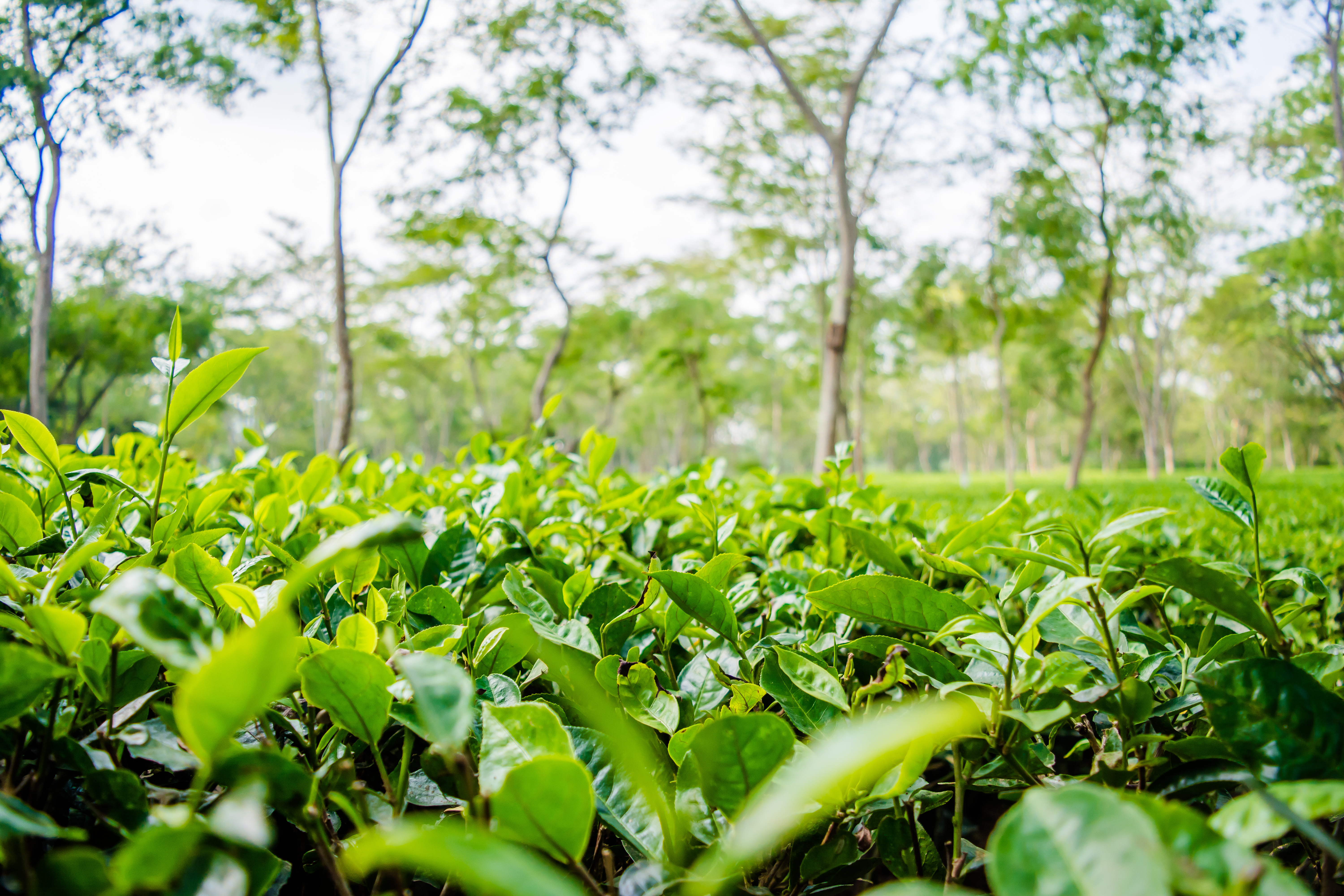
Assam Tea Leaf and Assam Leaves
Assam is the largest tea-growing region in the world, and the tea produced here is known for its unique characteristics. The region's warm and humid climate, combined with its rich soil and abundant rainfall, creates the perfect conditions for growing tea. The tea leaves from Assam are larger and more robust than those from other regions, which gives Assam tea its distinct taste and aroma. The leaves used to make Assam tea are large, dark, and glossy, with a slightly curled appearance. The leaves are harvested by hand, typically in the early morning hours, when the leaves are at their freshest. After harvesting, the leaves are withered, rolled, oxidized, and dried to produce the distinctive flavor and aroma of Assam tea.
Assam tea is typically harvested between March and Mid-November each year. After the leaves are picked, they are withered to reduce their moisture content, rolled to break down the cell walls and release the flavors, and then fermented to develop the tea's characteristic flavor and color. The final step is to dry the tea leaves, after which they are sorted and packaged for sale.
Assam tea is often blended with other types of tea to create a variety of blends, including English Breakfast and Irish Breakfast tea. It is also commonly used as a base for chai tea, which is a popular spiced tea beverage in India. In addition to its use in tea blends, Assam tea leaves are also used to make tea extracts, which are used in a variety of food and beverage products.
Overall, Assam tea is a delicious and distinct black tea that is beloved by tea drinkers around the world. Its bold flavor and unique characteristics make it a favorite for tea lovers who appreciate a good cup of tea.
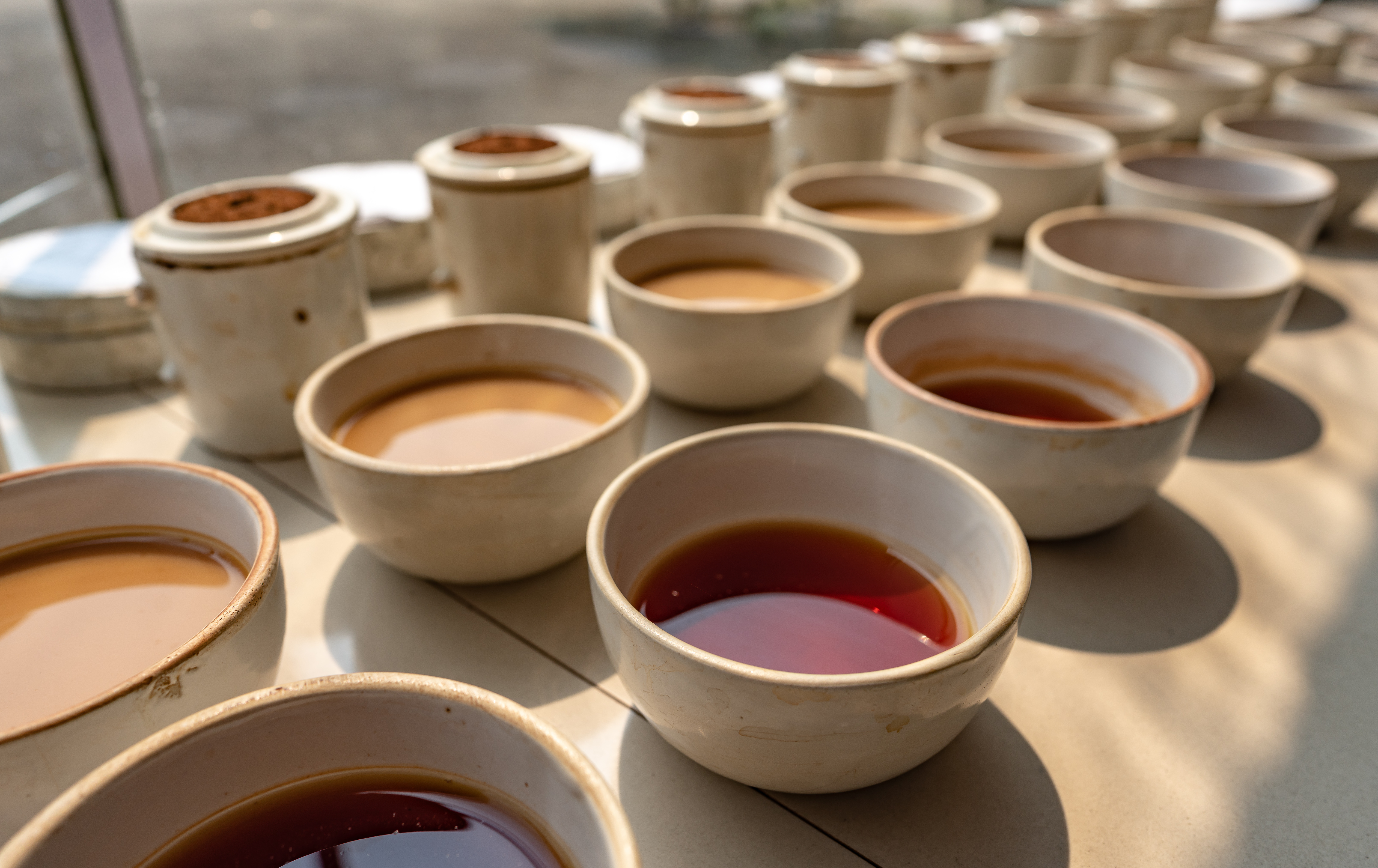
What is caffeine?
This section explores the topic of caffeine content in Assam teas, including how caffeine affects the body, how caffeine content is measured, and the average caffeine content of different types of Assam teas. It also provides a comparison of caffeine content in Assam teas with other types of teas and coffee.
- The caffeine content in Assam tea compared to other teas
- Factors affecting caffeine content in Assam tea (e.g., type of Assam tea, brewing method)
- Exploring the Best Assam Teas for Caffeine Content
Assam tea is known for its robust, full-bodied flavor and bright coppery color, and it is widely consumed all around the world. One of the reasons for its popularity is the high caffeine content found in the tea.
Caffeine is a natural stimulant found in tea leaves, coffee beans, cocoa beans, and other plants. It is known to provide a temporary boost in alertness, mental clarity, and energy. For many people, caffeine is an essential part of their daily routine, helping them to start the day, stay focused, and power through the afternoon slump.
Assam CTC tea is one of the most caffeinated teas available, and the caffeine content can vary depending on variety, age of leaf, manufacturing methods, steeping time, and the water temperature used during steeping. In general, Assam tea contains about 50-90 milligrams of caffeine per 8-ounce cup, which is similar to a cup of coffee.
Compared to other types of tea, such as green tea or white tea, Assam black tea or crush, tear, and curl (CTC) has a higher caffeine content due to its unique characteristics. Assam tea is grown at low altitudes and in a hot and humid climate, which produces tea leaves with higher levels of caffeine. Additionally, Assam tea is made from a specific tea plant called Camellia sinensis var. assamica, which has larger and more robust leaves than other tea plants, making it easier to extract caffeine from the leaves during the brewing process.
It is important to note that caffeine content can vary based on the brewing method and steeping time. For example, brewing tea for a longer time or using hotter water can increase the caffeine content. Similarly, using loose-leaf tea instead of tea bags can also result in higher caffeine content.
Overall, the caffeine content in Assam tea makes it a popular choice for those looking for a quick energy boost or a flavorful alternative to coffee. However, it is essential to consume caffeine in moderation and be mindful of the potential side effects, such as headaches, irritability, and diarrhea.
Factors Affecting Caffeine Content in Assam Tea
This section examines the factors that can affect the caffeine content in Assam teas, such as the time of year the tea is harvested, the processing method, and the quality of the tea leaves. It also explains how to brew Assam tea to control caffeine content.
The caffeine content in Assam tea can vary depending on several factors. Here are some of the main factors that affect the caffeine levels in Assam tea:
Tea Plant Varietal: Different tea plant varieties contain different amounts of caffeine. Assam tea is made from the Camellia sinensis var. assamica plant, which is known to have a higher caffeine content compared to other tea plant varieties.
Processing Methods: The way the tea leaves are processed can also affect the caffeine content. For example, black teas like Assam tea are more oxidized than green or white teas, which can result in higher caffeine levels.
Leaf Grade: The caffeine content can also vary depending on the grade of tea leaves used. Smaller, younger tea leaves tend to have higher caffeine content compared to older, larger leaves.
Brewing Time and Temperature: The longer you brew your tea and the hotter the water you use, the more caffeine will be extracted from the tea leaves.
Infusion Method: The caffeine content can also be affected by the way the tea is brewed. For example, loose-leaf Assam tea may have a higher caffeine content compared to tea bags because the leaves have more room to expand and release caffeine.
It's worth noting that while Assam tea generally contains more caffeine compared to other types of tea, it still has less caffeine compared to coffee. A standard 8-ounce cup of Assam tea contains about 50-90mg of caffeine, while an 8-ounce cup of coffee contains about 95-165mg of caffeine.
Understanding these factors can help you make informed choices when selecting and brewing Assam tea. You can adjust the brewing time, temperature, and infusion method to suit your preferences and manage your caffeine intake.
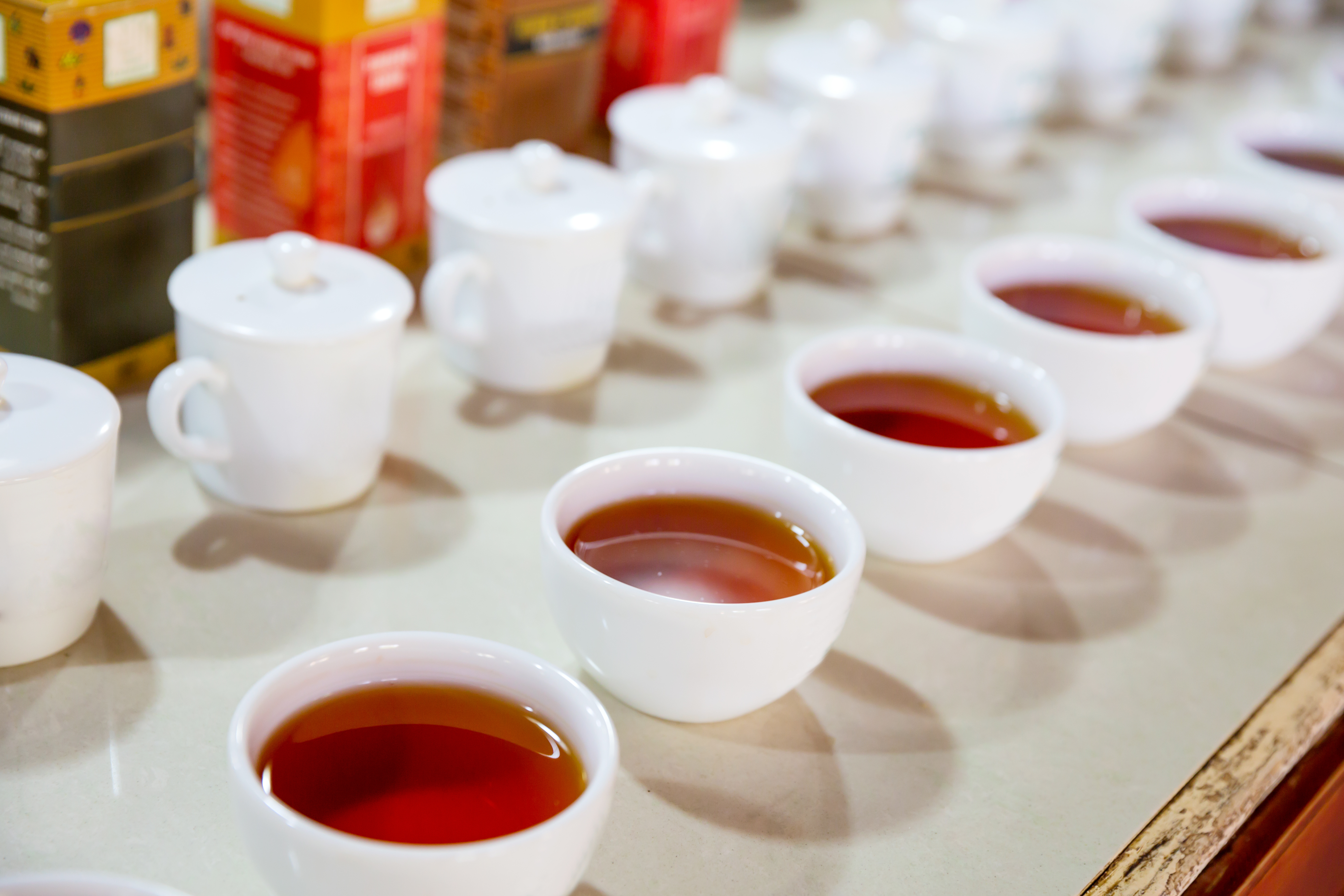
Loose-leaf Assam tea vs Assam tea bags
This section lists the best Assam teas for the high caffeine content, including loose-leaf Assam tea, Assam tea bags, and Assam tea blends. It also provides information on where to buy these teas and how to brew them to get the maximum caffeine content.
- Assam tea leaf grades and caffeine content
- Assam tea blends and their caffeine levels
- Comparing caffeine content in different Assam tea brands
If you're a caffeine enthusiast, you're probably looking for the best Assam teas to give you that much-needed caffeine boost. Here are some of the best Assam teas you can try:
Abhilex Organic Loose Leaf Artisan Black Tea - Abhilex Tea is a small tea garden in Assam, and their black tea is known for its strong, full-bodied flavor. It has a caffeine content of around 50-90 mg per cup.
Disha USDA Organic Loose Leaf Black Tea - Situated in one of the greenest parts of Assam in Moran, their black tea is known for its strong, full-bodied flavor. It has a caffeine content of around 47-90 mg per cup.
Halmari Gold Assam Black Tea - This tea is grown in the Halmari estate in Assam and is known for its robust and malty flavor. It has a caffeine content of around 47-90 mg per cup.
Korangani Assam Breakfast Loose Leaf CTC Black Tea - This tea is grown in the Korangani estate in Assam and is known for its bold and robust flavor. It has a caffeine content of around 50-90 mg per cup.
Manohari Gold Assam Black Tea - This tea is grown in the Manohari estate in Assam and is known for its golden tips and rich flavor. It has a caffeine content of around 70-80 mg per cup.
Wekhaj USDA Organic Loose Leaf Black Tea - This tea is made using the tips of the tea plant, which are known for their high caffeine content. It has a caffeine content of around 50-80 mg per cup.
It's worth noting that the caffeine content of Assam teas can vary depending on factors such as brewing time, water temperature, and the amount of tea leaves used. So, if you're looking for a stronger caffeine hit, you can try brewing your tea for a longer time or using more tea leaves.
Overall, Assam teas are a great choice for anyone looking for a high-caffeine tea with a robust flavor profile. Whether you prefer loose-leaf or tea bags, there's an Assam tea out there that's perfect for you.

Understanding the Health Benefits and Risks of Assam Tea
This section is about exploring the potential health benefits and risks associated with drinking Assam tea. It delves into the various nutrients and antioxidants found in Assam tea that may offer health benefits, such as improving heart health, reducing inflammation, and boosting immunity. Additionally, the section highlights some potential risks associated with excessive caffeine consumption, including anxiety, insomnia, and gastrointestinal issues. Overall, the section aims to provide a balanced view of the potential health benefits and risks of drinking Assam tea.
- Positive health effects of caffeine in Assam tea
- Potential negative health effects of too much caffeine
- Moderation and balance in caffeine consumption
Health Benefits of Assam Tea
Assam tea is packed with antioxidants, which are compounds that can help protect your body against damage from free radicals. Free radicals are molecules that can cause cell damage and contribute to the development of chronic diseases such as cancer, heart disease, and Alzheimer's disease.
Assam tea is also known for its potential to improve heart health. Some studies have shown that drinking black tea can help lower your risk of developing heart disease by reducing your blood pressure and cholesterol levels.
In addition to its potential heart health benefits, Assam tea may also have anti-inflammatory properties. Some studies have suggested that the antioxidants in black tea may help reduce inflammation in the body, which is linked to a variety of chronic diseases.
Another potential benefit of Assam tea is its ability to improve cognitive function. Some research has suggested that the caffeine and other compounds in black tea may help improve mental alertness and memory.
Rich in antioxidants: Assam tea is rich in antioxidants like flavonoids and catechins, which can help reduce inflammation, protect against cellular damage, and potentially lower the risk of chronic diseases like cancer and heart disease.
Boosts energy: The caffeine content in Assam tea can provide a natural boost of energy, making it a popular choice for those who need a pick-me-up.
May improve brain function: The caffeine and L-theanine in Assam tea may work together to improve brain function, including alertness, attention, and memory.
May aid in weight loss: Some studies suggest that the catechins and caffeine in Assam tea may boost metabolism and promote weight loss.
May lower the risk of diabetes: Some research has found that regular consumption of Assam tea may help lower the risk of type 2 diabetes by improving insulin sensitivity.
Risks of Assam Tea
While Assam tea has many potential health benefits, it is important to be aware of the risks associated with drinking too much of it. Like all types of tea, Assam tea contains caffeine, which can cause a range of side effects such as anxiety, jitteriness, and trouble sleeping.
Additionally, some people may be more sensitive to the caffeine in Assam tea than others. If you are sensitive to caffeine, it is important to limit your intake of Assam tea or switch to a decaffeinated version.
Another potential risk of drinking Assam tea is that it may interact with certain medications. If you are taking any medications, it is important to talk to your doctor before adding Assam tea to your diet to make sure it is safe for you to consume.
May have negative effects on sleep: The caffeine content in Assam tea can disrupt sleep if consumed in large quantities or close to bedtime.
May cause stomach discomfort: Drinking too much Assam tea may cause stomach discomfort, as it is acidic and can cause heartburn or indigestion in some people.
Overall, while Assam tea can offer a range of health benefits when consumed in moderation, it is important to be aware of its potential risks and to listen to your body to determine how much tea is right for you.
How to Maximize the Health Benefits of Assam Tea
This section is about providing tips on how to maximize the health benefits of Assam tea. It discusses the various compounds and nutrients found in Assam tea that offer health benefits, such as antioxidants, polyphenols, and flavonoids. The section also covers the potential health benefits of Assam tea, such as reducing the risk of cardiovascular diseases, improving brain function, and reducing inflammation. The tips provided include selecting high-quality Assam tea, brewing the tea properly, and consuming it in moderation. It also suggests adding healthy ingredients such as lemon or honey to enhance the tea's health benefits. Overall, the section aims to help readers understand how to make the most of Assam tea's health benefits.
If you are interested in adding Assam tea to your daily routine, there are a few things you can do to maximize its potential health benefits:
Brew it correctly: To get the most out of your Assam tea, it is important to brew it correctly. This means using the right water temperature and steeping it for the right amount of time. For Assam tea, the recommended water temperature is 205°F (96°C), and the recommended steep time is 3-5 minutes.
Drink it in moderation: While Assam tea has many potential health benefits, it is important to drink it in moderation to avoid the negative side effects of caffeine.
Combine it with a healthy diet and lifestyle: While drinking Assam tea can be a part of a healthy diet, it is important to also eat a balanced diet and engage in regular exercise to maximize its potential health benefits.
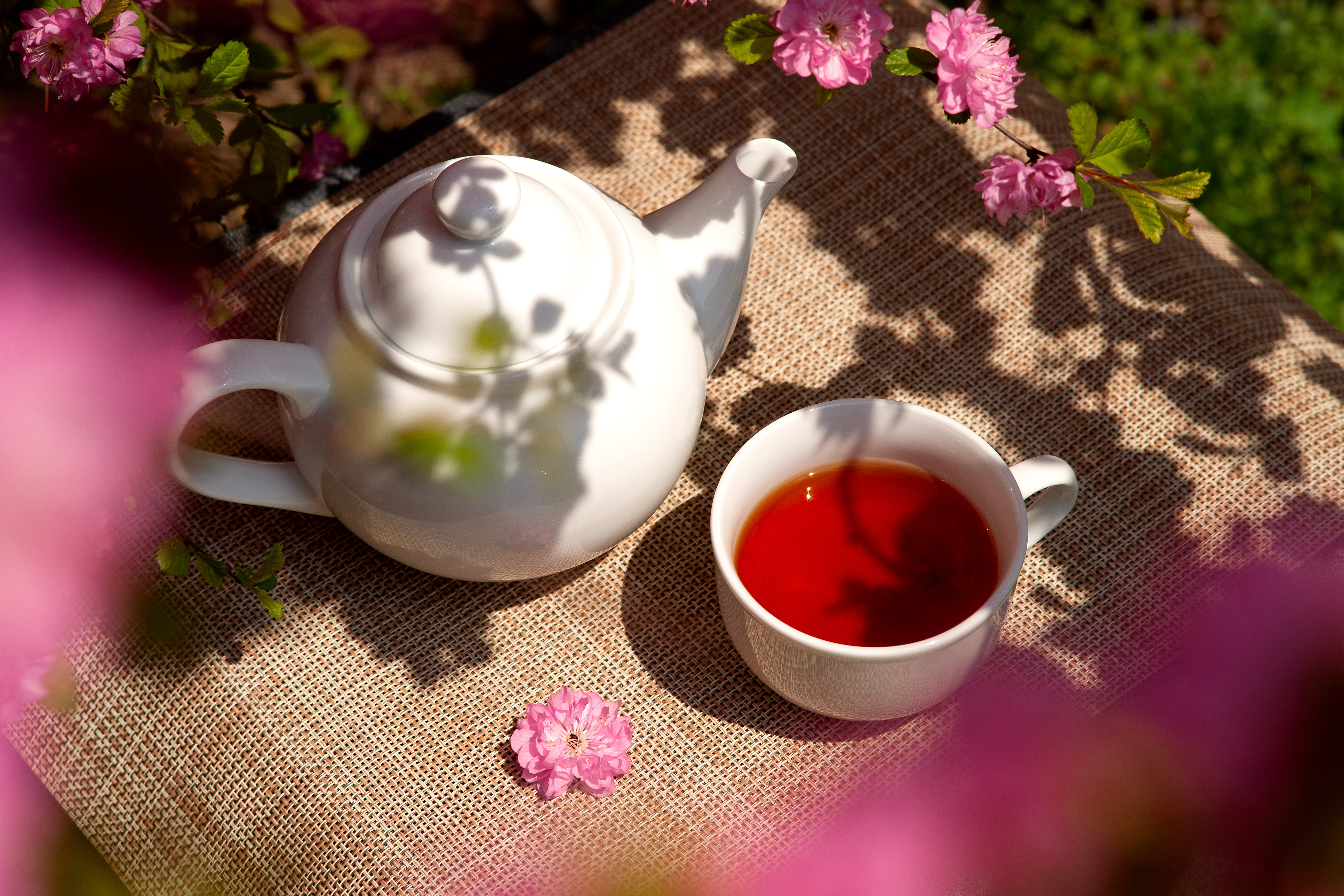
Tips for Enjoying Assam Tea and Managing Your Caffeine Intake
The section is about providing practical tips and recommendations for individuals who want to enjoy the health benefits of Assam tea while managing their caffeine intake. The section emphasizes the importance of moderation in consuming Assam tea, which contains a moderate to a high amount of caffeine, and suggests ways to control caffeine intake through different brewing methods, water temperature, and infusion time. The section also suggests some general tips on how to make the most out of your Assam tea experience, such as selecting high-quality loose-leaf Assam tea, experimenting with different tea blends and flavors, and using the right tea accessories.
- Tips for brewing the perfect cup of Assam tea
- How to manage caffeine intake when drinking Assam tea
- Assam tea and sleep: how to avoid disrupting your sleep patterns
Know Your Caffeine Tolerance: One of the most important tips for managing your caffeine intake is to know your tolerance level. If you're sensitive to caffeine, you may want to limit your consumption or choose a decaffeinated version of Assam tea.
Choose High-Quality Tea: When it comes to enjoying Assam tea, choosing high-quality loose-leaf tea can make a big difference in both taste and caffeine content. Look for tea that is sourced from a reputable producer and packaged in a way that ensures freshness.
Consider Blends: Another option for managing your caffeine intake is to choose a blend that includes other ingredients, such as herbs or spices, which can help to reduce the overall caffeine content of the tea.
Experiment with Brewing Methods: The way you brew your Assam tea can also have an impact on the caffeine content. Experiment with different brewing methods and temperatures to find the perfect balance of flavor and caffeine for your tastes.
Enjoy in Moderation: As with any food or beverage, moderation is key. Enjoying a cup or two of Assam tea per day can provide health benefits without overloading your body with caffeine.
By following these tips, you can enjoy the rich flavor and health benefits of Assam tea while managing your caffeine intake to suit your individual needs and preferences.
Final thoughts on Assam tea and caffeine
In summary, Assam tea is a delicious and complex beverage that offers a range of caffeine content depending on various factors. Understanding the caffeine content in Assam tea can help you enjoy this beverage in a more informed and responsible way. Whether you prefer loose-leaf Assam tea or Assam tea bags, it is important to find the best Assam tea for your taste preferences and caffeine needs. Remember to enjoy your cup of Assam tea in moderation and balance, and discover the many health benefits and risks associated with this beloved tea.
If you're interested in trying some of the best loose-leaf Assam teas, we recommend checking out TeaOrb, offering a wide selection of high-quality teas, including several varieties of Assam teas. You can visit www.teaorb.com to browse the collection and find the perfect tea for you.




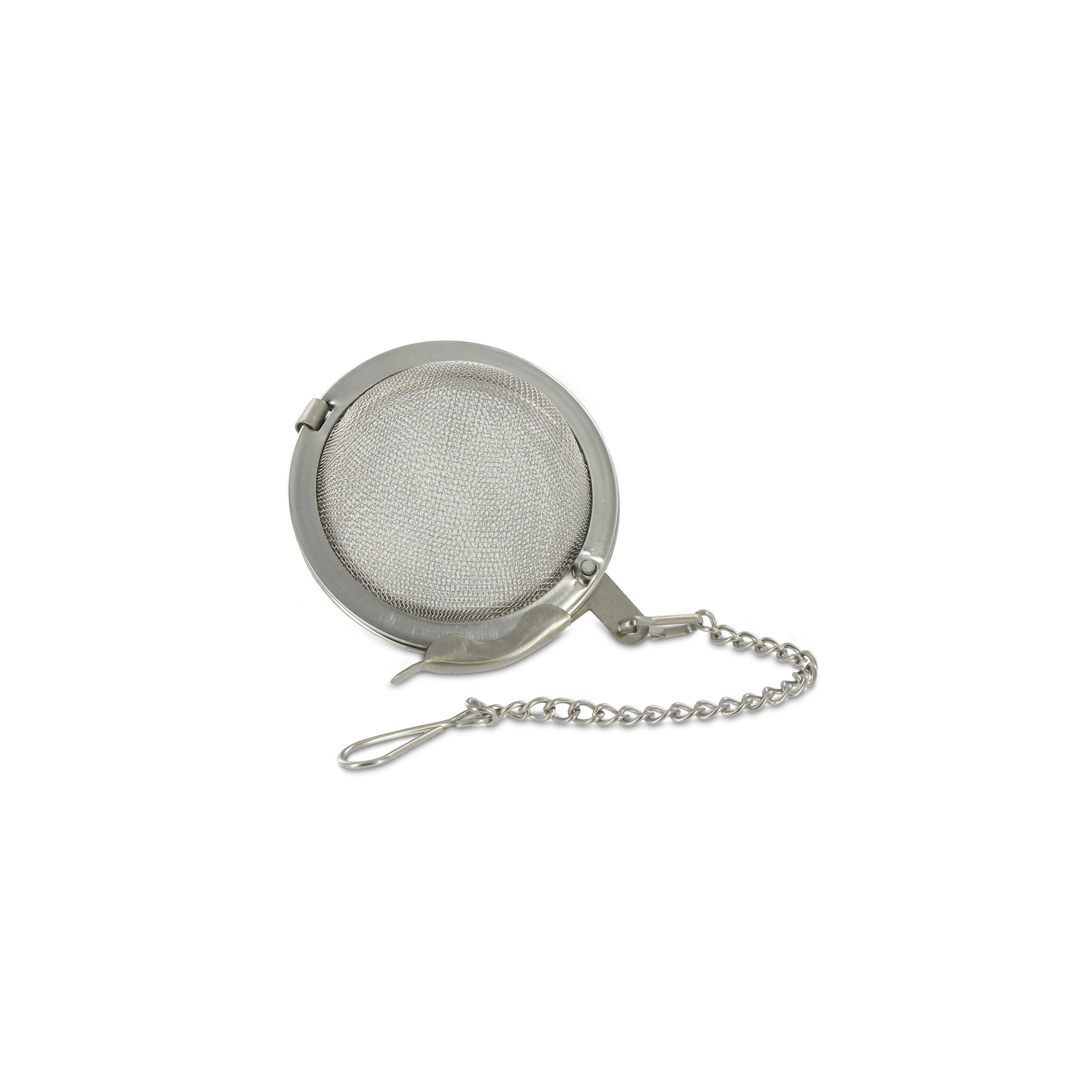
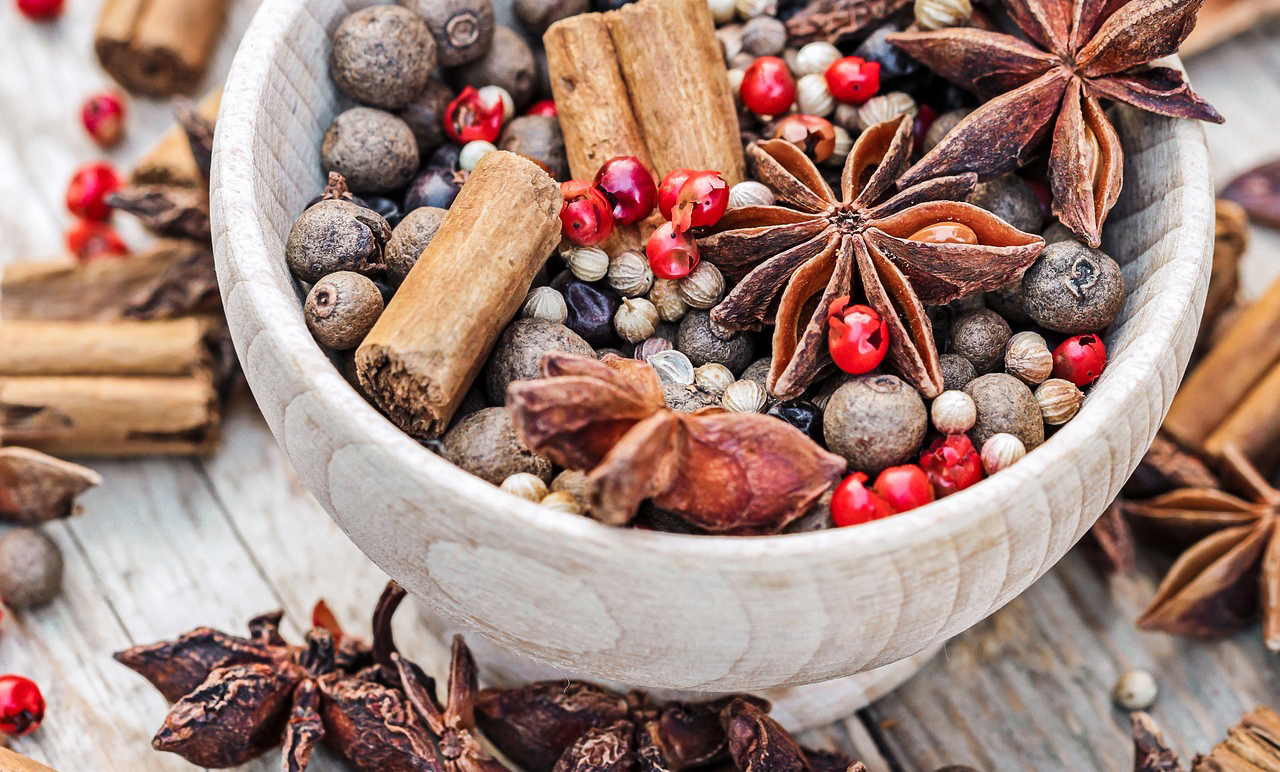








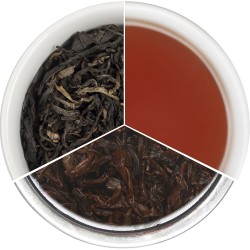
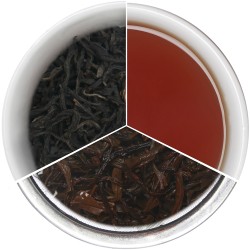
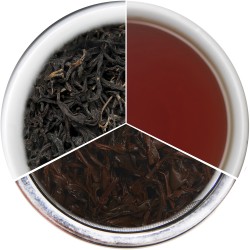
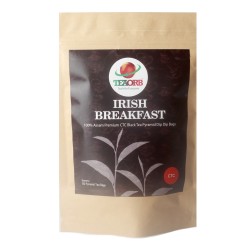
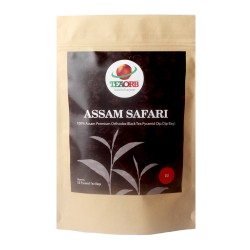
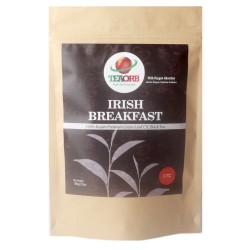
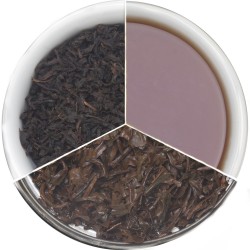






Leave a Comment